Andrew here. Jose was just talking about Romeo & Juliet so there's our blogging segueway to Shakespeare in Love! I love this movie, despite the less than stellar reputation it's built up since its release 15 years ago. I’d argue that it’s the most successfully executed romantic comedy in the past 20 years. Those that claim that Shakespeare in Love is little more than a bauble often forget that it was penned by one of the finest English language dramatists of the 20th century, Tom Stoppard. Films written by playwrights work well for this column because playwrights are innately aware that monologues are like great set-pieces to show off the acting craft. Shakespeare in Love is filled with monologues and sotto voce asides and it’s not just because of Stoppard’s playwright sensibilities. The very best trick Stoppard plays in Shakespeare in Love is delightfully imping Shakespeare’s technique in the film.
But the monologue. Today we focus on that slight, but effective Supporting turn which won the Oscar.
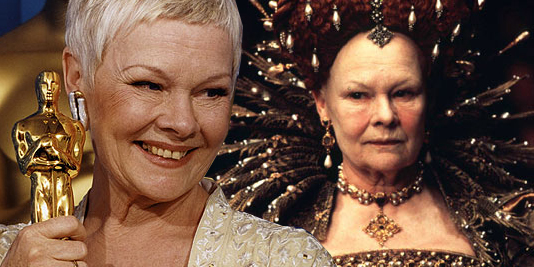
Shakespeare in Love is both ode to Shakespeare and spoof of his dramaturgy, right down to the entrance of the Royal Official to end everything by deciding who and what goes where. Three cheers for Judi Dench’s Oscar winning turn as Queen Elizabeth. There’s been much handwringing about Dench’s Oscar, one of the many stolen ones from Shakespeare in Love but I always tend to forget about the brevity of the role in the watching both because the film goes down so easy and because Dench’s role, short as it may be, is so effective. Dench’s ability to pull focus when on screen has always been impressive and each time she speaks in the film it’s in something of a monologue, or it appears to be a monologue because everyone around becomes duller. Queen Elizabeth has been played by so many women, so how to make her intriguing and worthy of the film - and in just three scenes? Call in Judi Dench.
The film comes to its close as Viola de Lesseps (illegally) turns up to play Juliet on-stage to thunderous applause. The cheering is curtailed by the appearance of Mr Tilney, the Master of the Revels, ready to arrest everyone for public lewdness.
Simon Callow manages to get in the funniest line of the scene. "That woman is a woman!" But, Tilney doesn’t get much chance to lord over the playhouse because the Queen’s voice cuts through the room, almost magically and she appears.
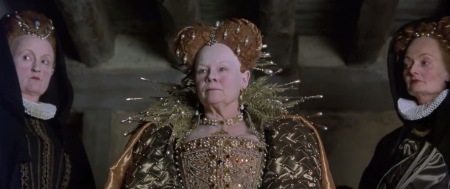
Mr Tilney! Have a care with my name, you will wear it out.”
On one hand with eight minutes screen-time at her disposal Dench is not doing much, ostensibly, but she’s placed in a position of having to get to the root of the character immediately. The steely gaze, her carriage as she makes her way to the stage, the posture – it’s all very Queenly in a way that’s played broadly but still on point.
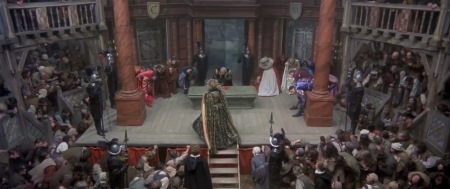
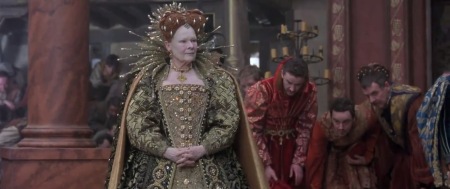
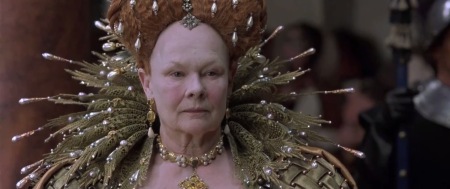
The Queen of England does not attend exhibitions of public lewdness, so something is out of joint. Come here Master Kent, let me look at you. Yes the illusion is remarkable, and your error Mr Tilney is easily forgiven. But I know something of a woman in a man’s profession. Yes, by God, I do know about that."
Madden often directs utilising theater-friendly shots of the ensemble at the expense of closeups. With Dench’s Queen, though, her scenes are all pronounced by her face full on-screen. That look she gives on the line, “By God, I do know that” (pictured above) is one of the best examples ever of supporting performers playing it like they're the lead in their own story (the one just offscreen). Dench is lucky that audiences familiarity with Elizabeth's legend adds to our understanding but even as this almost deus ex machina like monologue is aiming to land with comedic worth, she’s adding gradations where you don’t expect. The line could read as merely funny but with Dench it's also poignant. With her inflections an entire life's work is put into its utterance.
That is enough from you, Master Kent. If only Lord Wessex were here.
And there he is!
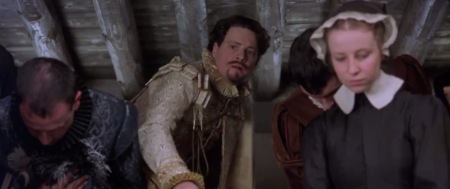
(Two doesn’t make a trend, but my favourite thing about Colin Firth in the 90s is his insistence on being romantic foils to the Fiennes brothers in Best Picture winners from Miramax. Talk about a niche!)
There was a wager, I remember as to whether a play could show the very truth and nature of love. I think you lost it today.
This line recalls Dench’s earlier scene where she gives my favourite line-reading in the film. "But playwrights teach nothing about love, they make it pretty, they make it comical, or they make it lust. They cannot make it true."
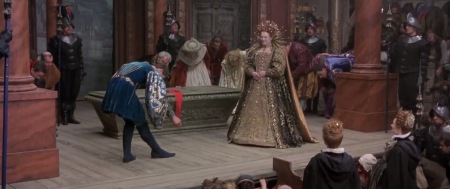
Master Shakespeare, next time you come to Greenwich come as yourself and we will speak some more.
She leaves the playhouse, but the monologue isn’t over. She still has more judgements to make.
Why, Lord Wessex, lost your wife so soon?
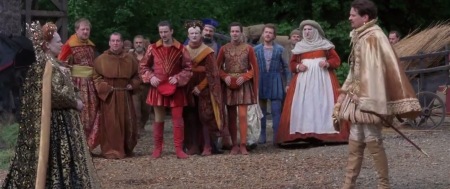
And here, just as the Duke must grapple with how to resolve the issues in Romeo and Juliet so must the Queen. How is this to end? Wesex wonders. Her reply:
As stories must when love’s denied – with tears, and a journey. Those whom god has joined in marriage not even I can put asunder. Master Kent, Lord Wessex as I foretold has lost his wife in the playhouse. Go make your farewell and send her out, it’s time to settle accounts.
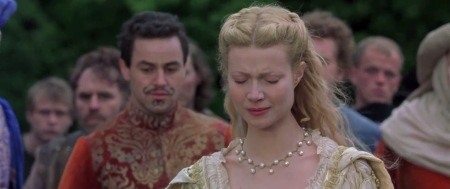
(Gwyneth Paltrow is so fantastic in this film. Viola de Lesseps plays to her strengths more than anything she’s done before or after. This silent moment reacting to the Queen's judgement always kills me.) Dench wraps it all up neatly: Wessex gets his bride, Will gets his money and Viola shall get a heroine named after her.
Tell Master Shakespeare something more cheerful next time, for Twelfth Night."
And with that the Queen departs, but not before being faced with a dirty puddle.
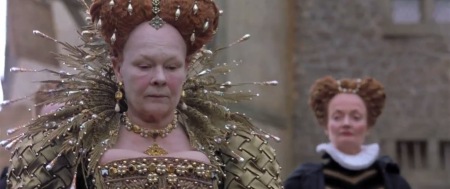

My sister once jokingly called Shakespeare in Love the movie where Judi Dench walks through a dirty puddle and gets an Oscar. I've often wondered why THAT moment to mark her exit from the film, although her “Too late, too late!” to her bannermen after she’s walked through it is a pure delight. Of course, it’s all really part of Shakespeare in Love’s impish intent on being less pristine than typical period fare in innocuous moments (Will’s dirty fingernails another example). It’s an easy joke to end on but the 'royals, they’re just like us' joke never fails to amuse. Even if it’s a lie. Judi Dench’s Queen Elizabeth is nothing like these plebeians. She’s above them all.
Her win is a great nineties Oscar moment all the way from Robin Williams’ “There’s nothing like a Dame” quip to her genuine surprise and then a truly excellent speech.
I feel for eight minutes on the screen I should only get a little bit of him. I do feel the best bit about the Academy Awards is being nominated. You live in a kind of haze for several weeks and terrible thing is that someone’s got to win and my heart goes out to the other four who didn’t and also my admiration.”
I am always a sucker for winners graciously mentioning their fellow nominees and Judi's stately composure makes the slightly teary sincerity of her speech all the more lovely to behold. It's a more gentle indication of royalty, but it proves the same point as Shakespeare in Love: Judi Dench is Queen.